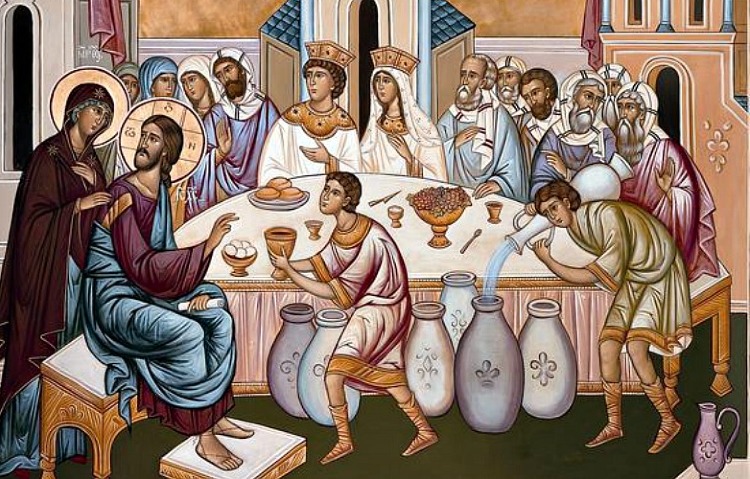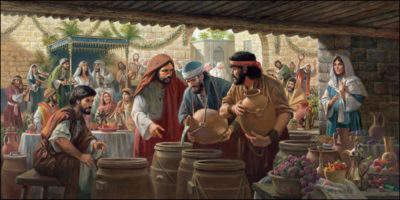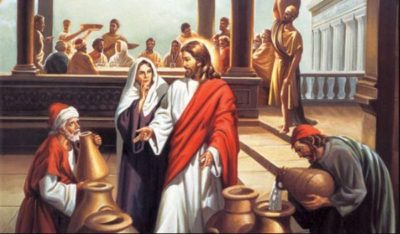 [1]I left the empty life behind. He turned the water into wine.
[1]I left the empty life behind. He turned the water into wine.
—Dave Stearman, “He Turned the Water into Wine” (1973)
He comes to make His blessings flow Far as the curse is found.
— Isaac Watts, “Joy to the World” (1719)
A Jewish Wedding
They were getting married. A young couple. A simple celebration. Their families weren’t rich. Even scraping together enough money to pay for the food and wine had been difficult, but family and friends chipped in.
Organization was a headache, too, but the young couple had found a family friend to serve as coordinator. Her name was Mary. She was a widow from nearby Nazareth. She was known for her godliness and good sense. She had raised a large family and had lots of practical experience. Perfect for a planner. There was more, though, something unusual. Rumors had it that strange things happened when her first Son was born. Angels. Stars. Prophecies. She and her family had spent time in Egypt, too, in Alexandria perhaps. No doubt she had stories to tell, if only she would.
There was one more thing about the wedding. Mary’s Son Jesus had recently taken up the calling of Rabbi, a teacher of the Law. The desert prophet John had introduced Him to Israel, and thus He had already begun to attract a small following. The families had invited Jesus to join the celebration and to bring His disciples. More mouths to feed. But rabbis were always well-received at Jewish weddings.
Awaken Your Child’s Love Of Learning And Put God Back Into History! Read More Here. [2]
The bridal procession itself had begun at dusk. Covered with a veil and surrounded by her childhood friends, the young bride had left her father’s house and set out for her new home. Before her went pipers. Then came those who passed out oil and wine to the grownups, and nuts to the children. Some carried torches or lamps on poles. Those nearest the bride had myrtle branches or wore garlands of flowers. Everyone rose to greet the procession and to pronounce blessings and praise.
Once the bride reached her new home, she was taken to her espoused husband. Then came the official pronouncement: “Take her according to the Law of Moses and of Israel.” The groom signed the contract, the written vows in which he promised to care, keep, and provide for his wife. Next came the ceremonial washings and their accompanying benediction. Finally, there was the bridal cup and one more blessing.
Then came feasting. There were many guests. Perhaps more than the young groom had thought would come. The wine began to run low. In Jewish life and for a Jewish festival, this meant disaster. Mary, always watchful, saw the problem. There was no backup plan for wine. But Mary had something else in mind.
Mary went to Jesus and said simply, “They have no wine.”
Mary and the Wine
We aren’t told exactly what Mary was thinking. We’re not sure if Mary completely understand who her Son really was. Certainly, He had always been responsible and reliable as a young man. And with Joseph gone, she had learned to trust Jesus with the ordinary affairs of money and family. But given Jesus’ response, she may have actually been looking for a miracle.
John had baptized Jesus and hailed Him as the Lamb of God and as the One who would pour out the Holy Spirit. And, in fact, the Spirit had descended upon Jesus, and a heavenly voice had pronounced Him the Son of God. Surely Mary had heard of all this. And just as surely it would have resonated with the old memories and meditations she had locked up in her heart. What was in Mary’s heart?
Well, what had the angel said? “He shall be called the Son of the Highest, and the Lord God shall give unto Him the throne of His father David. … He shall be called the Son of God” (Luke 1:32, 35). “Messiah the Lord.” That’s what the angels had called Him to the shepherds. “Born, King of the Jews,” the wise men had said.
 [3]Had the time finally come? Was everything about to come together? Did she need to give one little nudge? Or maybe she simply needed help, and her observation veiled a motherly hint for action.
[3]Had the time finally come? Was everything about to come together? Did she need to give one little nudge? Or maybe she simply needed help, and her observation veiled a motherly hint for action.
“They have no wine,” she said.
Jesus said, “Woman, what have I to do with thee? My hour is not yet come.”
Whatever Mary may have had in mind, Jesus was now on His Father’s timetable. His final revelation as Messiah lay three and half years in the future. In the meantime, it wasn’t for Mary to dictate, however gently, how He should pursue His course to the cross and the throne.
In confidence, humility and meekness, Mary simply turned the matter over to Jesus and trusted Him for whatever resolution pleased God. She told the servants, “Whatever He tells you to do, do it.”
Water Into Wine
Jesus directed the servants to six large stone water pots. These contained the water that the faithful used for ritual purifications. Each could hold 20 to 25 gallons. But the crowd had already used up a lot of the water. So Jesus told the servants to fill the water pots. They did… up to the brim. Jesus told them to carry some of what was in the jars to the table master, the one who oversaw the banquet. They obeyed.
When the table master tasted what the servants brought him, he immediately called for the groom. He said, “Every man sets out his good wine at the beginning of the feast; then, when everyone’s had plenty to drink, he puts out the worse. But you’ve kept the best until now!” The groom, unaware of the miracle, didn’t know what to say.
This was the beginning of Jesus’ miracles, His first manifestation of His power and glory (John 2:11). Scripture simply says, “and His disciples believed on Him.”
A Feast of Wines
The prophets had described the coming of Messiah through a great many figures and metaphors: water, wind, and fire were among their favorites. But another prominent, recurring image was that of festival, of banqueting, and every good feast involved lots of good wine. Here are a few of the prophecies that connect Messiah with the free gift of celebratory wine:
And in this mountain, shall the LORD of hosts make unto all people a feast of fat things, a feast of wines on the lees, of fat things full of marrow, of wines on the lees well refined (Isa. 25:6).
Ho, everyone that thirsteth, come ye to the waters, and he that hath no money; come ye, buy, and eat; yea, come, buy wine and milk without money and without price (Isa. 55:1).
Behold, the days come, saith the LORD, that the plowman shall overtake the reaper, and the treader of grapes him that soweth seed; and the mountains shall drop sweet wine, and all the hills shall melt (Amos 9:13; cf. Joel 3:18).
It was no accident that Jesus began His ministry by providing an abundance of wine for a wedding. The miracle was an open declaration that He was the Messiah and the divine Bridegroom. But not just that … also that the kingdom of God had come in power and that God was about to make all things new. The sacrament He established just before His death said the same thing … new and eternal life through the blood of the new covenant (Matt. 26:27-29). But Jesus ordained wine for the sacrament (instead of blood) — wine for the celebration of victory.
As our Priest, Jesus has completed and perfected our atonement. As our warrior King, He has defeated sin and death. His work is done. He has taken His throne (Heb. 10:11-14). It is time to celebrate and rejoice. He summons us to eat and drink with Him at His table in His kingdom (Luke 22:28-30; cf. Matt. 8:11).
The Lessons of the Miracle
Jesus’ first miracle displayed His power as Creator. We aren’t told whether He called new carbon molecules into existence or merely restructured the protons of the existing hydrogen and oxygen molecules to make the water into wine. It doesn’t matter. This was a creative miracle. Jesus is God. Period.
Entertain Your Kids For HOURS On The Road — Without A DVD Player! Read More Here. [4]
Jesus performed the miracle at a simple wedding, as the traditional wedding ceremonies remind us, saying of human marriage: “which holy estate Christ adorned and beautified with his presence, and first miracle that he wrought, in Cana of Galilee.” At the beginning of the world He ordained marriage and gave away the bride (Gen. 2:18-25). Now as the Divine Bridegroom, He blessed marriage anew and revealed Himself in and through it.
 [5]In the wine miracle, Jesus displayed the stark contrast between His own ministry and that of John the Baptist. “For John the Baptist came neither eating bread nor drinking wine” (Luke 7:33). John majored in austerity and abstinence, traits appropriate for a nation that stood on the verge of destruction (Matt. 3). But Jesus came to establish a kingdom whose marks are “righteousness, peace, and joy in the Holy Spirit” (Rom. 14:17).
[5]In the wine miracle, Jesus displayed the stark contrast between His own ministry and that of John the Baptist. “For John the Baptist came neither eating bread nor drinking wine” (Luke 7:33). John majored in austerity and abstinence, traits appropriate for a nation that stood on the verge of destruction (Matt. 3). But Jesus came to establish a kingdom whose marks are “righteousness, peace, and joy in the Holy Spirit” (Rom. 14:17).
To perform the miracle, Jesus used waters set aside for ritual purifications. These were not washings that God had ordained, but ritual cleansings established by tradition (Mark 7:3-4). Apparently unimpressed with Jewish tradition, Jesus swept it aside to rescue an ordinary wedding and ensure the happiness of two young lovers and their guests.
In this miracle, Jesus turned the ordinary into the extraordinary. He could have left the wedding guests with water. Certainly, water is life-sustaining. He could have given them grape juice. But He gave them wine. He replaced the mundane with the extraordinary, the bland with celebration. The good news is, He still does it with human lives today.
In the miracle, Jesus showed Himself the fulfillment of Old Testament prophecy and announced the advent of His kingdom. He chose to work with images of joy, celebration, prosperity, and renewal. This is not a Neo-Platonic kingdom locked up in our hearts, but a kingdom with real consequences in the real world. “He comes to make His blessings flow far as the curse is found.”
Conclusion
It has been nearly 2,000 years since Jesus turned the water into wine. Very few of the wedding guests knew or understood what He had done. Jesus wasn’t trying to prove His identity or start an advertising campaign. Jesus Christ is the living God who does wonders. He is Life: He makes all things new. Those with faith and “eyes to see” will take comfort in the water into wine miracle. Those without faith will see nothing but myth and superstition. But then againv… such will not believe “though one rose from the dead.”
Dedicated To Jared Brewer, Who Makes Great Wine
For Further Reading:
Alfred Edersheim, “The Life and Times of Jesus the Messiah” (New York: Longmans, Green, and Co., 1904).